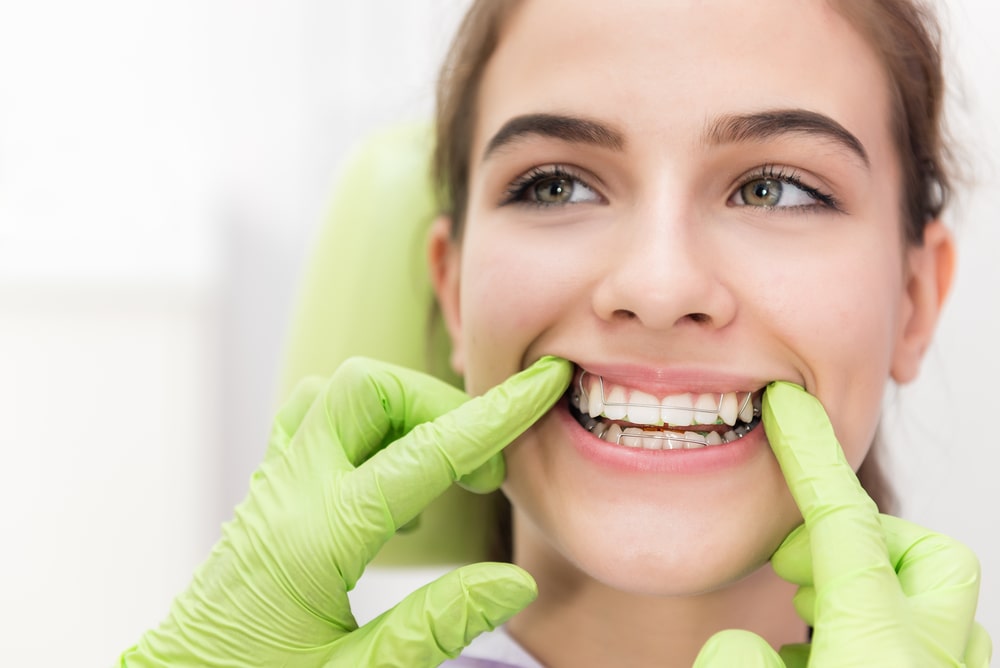
Say Goodbye To Crowded Teeth
Adult Braces Castle Hill
At Beyond Infinity Dental, we offer orthodontic treatments to help you achieve a beautiful smile.
Whether you’re interested in traditional braces, fast braces, or modern adult braces in Castle Hill, our dental team is dedicated to offering high-quality care tailored to your needs.

Why Braces Castle Hill
Choosing braces in Castle Hill means accessing a wide range of treatment options tailored to your needs. Whether you opt for conventional metal braces, discreet Fast Braces like Smilefast and Cfast, hidden lingual braces, or virtually invisible clear aligners such as Invisalign, our expert team is here to help you achieve a confident, straighter smile.
At Beyond Infinity Dental, we offer personalised care that prioritises your comfort and results.
Getting Your Castle Hill Orthodontics
Getting your treatment option is a step towards a more attractive and perfect smile.
Whether you’re dealing with crooked teeth or misalignments or want to improve the appearance of your smile, our wide range of orthodontic options can be of major help.
From traditional braces to modern clear aligners, our experienced team at Beyond Infinity Dental is committed to helping you achieve straighter teeth with personalised orthodontic care and advanced treatments that boost your self-esteem.

Can orthodontic treatment enhance my overall oral health?
Yes, orthodontic treatment can significantly improve your oral health. Straightening crooked or crowded teeth makes it simpler to clean your teeth, lowering the risk of cavities, gum disease, and other dental issues. Proper alignment also helps improve your bite, preventing jaw pain and wear on your teeth, which will boost your self-confidence.
What are the benefits of fast braces compared to traditional braces?
Fast braces, such as Smilefast and Cfast, are designed to provide quicker results by focusing on the front teeth, which are more visible when you smile. They use advanced technology to move teeth more rapidly, often reducing treatment time compared to traditional braces. However, they may not be suitable for more complex orthodontic cases.
How long does orthodontic treatment typically take?
The duration of orthodontic treatment changes depending on the complexity of your case and the type of braces or aligners used. Treatments may last a few months, but some cases may require a longer or shorter timeline. Your dental expert will provide a more accurate estimate during your consultation.
How do I know which type of braces is right for me?
Choosing the right braces depends on various aspects, like the complexity of your case, your aesthetic preferences, and your lifestyle. During your initial consultation, your dental expert will thoroughly assess your teeth and discuss the ideal options for your specific needs: traditional braces, fast braces, and lingual braces.
Can clear aligners be an alternative to braces?
Yes, clear aligners like Invisalign can be an excellent alternative to braces for minor orthodontic issues. These aligners are less visible and removable, making them a convenient option for patients with less severe misalignments or spacing issues. However, the suitability of aligners depends on the specific case.
Can adults get the same results with braces as teenagers?
Yes, adults can achieve excellent results with orthodontic treatment, just like teenagers. While the treatment duration might be slightly longer due to mature bone structure, modern orthodontic techniques, including fast braces and Invisalign, are highly effective for adult patients.
Can I get orthodontic treatment if I have existing dental restorations like crowns or bridges?
Yes, you can still undergo orthodontic treatment with existing dental restorations. Your dentist will carefully plan your treatment to ensure that the movement of your teeth does not negatively impact your crowns, bridges, or other restorations. Some adjustments may be necessary to accommodate your treatment plan.
How much do braces and aligners typically cost?
The cost of braces or clear aligners varies based on factors such as the type of treatment, the duration, payment plans, and the complexity of your case. Traditional braces are more affordable, while clear aligners like Invisalign may be more expensive.
Your dentist will provide a detailed cost estimate during your consultation and discuss payment options.
Can orthodontic treatment help with speech issues caused by misaligned teeth?
Yes, orthodontic treatment can help improve speech issues caused by misaligned teeth or jaw positioning. Correcting these problems can enhance your speech clarity and overall communication. Your dentist can evaluate whether orthodontic treatment can address your specific speech concerns.
Do braces or clear aligners affect how I brush and floss my teeth?
Yes, braces and clear aligners require adjustments to your oral hygiene routine. The brackets and wires in braces can make brushing and flossing more challenging, so it’s essential to use specific brushes and floss threaders to clean around them effectively.
Clear aligners must be removed for brushing and flossing, making it easier to maintain oral hygiene. However, they must also be cleaned regularly.
Can orthodontic treatment help with TMJ (temporomandibular joint) disorders?
Orthodontic treatment can sometimes help with TMJ disorders by correcting bite alignment issues contributing to jaw pain and discomfort. However, TMJ disorders can have various causes, so your dentist must evaluate your situation to determine if orthodontics could be a beneficial part of your treatment plan.
How visible are lingual braces compared to other types of braces?
Lingual braces are placed on the teeth’s back (lingual) side, making them virtually invisible from the front. They offer a more discreet option for those concerned about the aesthetics of traditional braces. However, due to their placement, they may require some adjustment for speech and comfort.
Can orthodontic treatment address gaps between teeth?
Yes, orthodontic treatment effectively closes gaps between teeth, known as diastemas. Depending on the size and location of the gaps, your dentist may recommend braces, clear aligners, or other orthodontic appliances to bring the teeth closer together and create a more uniform smile.
Can I still play sports while having braces on?
Yes, you can still take part in sports while undergoing orthodontic treatment. However, we recommend wearing a custom-made mouthguard to protect your braces and teeth from injuries. This is particularly important for contact sports with a higher risk of impact.
What foods should I stay away from while wearing braces?
When wearing braces, avoiding hard, sticky, or chewy foods that can damage the brackets and wires is best. These include popcorn, nuts, chewing gum, and certain candies. Cutting foods like apples or carrots into smaller pieces can also help prevent issues.
How often will I need to visit the dentist during my orthodontic treatment?
Regular visits are crucial for monitoring your progress and making necessary adjustments. Depending on your treatment plan, you’ll typically need to visit the clinic every few weeks. These appointments help ensure that your teeth are moving as expected and that your braces or aligners are in good condition.
Is there any discomfort associated with wearing braces?
It’s common to experience discomfort, especially after braces are fitted or adjusted. Over-the-counter painkillers can be utilised to manage this, which often goes away in a few days. Clear aligners generally cause less discomfort compared to traditional braces.
Will I need to wear a retainer after my braces are removed?
Yes, wearing a retainer after removing your braces is crucial for maintaining your new smile. Teeth inherently have the tendency to shift back to their original positions, and a retainer helps keep them in place. Your dentist will advise you on how long and how often you must wear it.
What should I do if a bracket or wire loosens or breaks?
If a bracket or wire loosens or breaks, contact an experienced dental clinic to schedule a repair appointment.
Can I get adult braces if I have dental work like crowns or bridges?
Yes, you can still get adult braces in Castle Hill even if you have existing dental work such as crowns or bridges. Your dentist or specialist orthodontist will carefully plan your treatment to ensure the braces work effectively without damaging your existing dental restorations.
Can adults achieve the same results as teenagers with braces in Castle Hill?
Yes, adults can achieve excellent results with adult braces in Castle Hill. Although treatment may take longer due to the maturity of the bones, modern orthodontic techniques like Fast Braces and Invisalign are highly effective for adults. Whether you’re looking to fix crowded teeth or improve your smile, your specialist orthodontist will ensure the best approach for your unique needs.
Note: Any surgical or invasive procedure carries risks. Before proceeding, you should seek a second opinion from an appropriately qualified health practitioner.
Book with Beyond Infinity Dental Today
We go above and beyond to provide the very latest advances in dental medicine to give patients the treatments they need for optimal dental health and well-being.



